A Skeptic Goes Inside Noah’s Ark
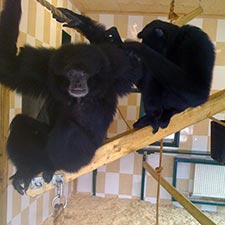
Two Gibbons on Noah’s Ark, bearing no resemblance whatsoever to humans.
Evolution and Creationism in England
During the first week of February, 2009, on the occasion of Charles Darwin’s 200th birthday celebrations at various locals around England (including his birthplace city of Shrewsbury — see photo montage below), my hosts Andrew Kelly (a science writer who authored a gorgeous coffee-table book entitled Darwin: For the Love of Science) and Bruce Hood (a University of Bristol cognitive psychologist and author of the forthcoming book Supersense), arranged for a visit to Noah’s Ark Zoo Farm in Bristol, run by a kindly creationist gentleman named Anthony Bush. (Yes, in addition to being a zoo for the public to tour, it is a working farm.)
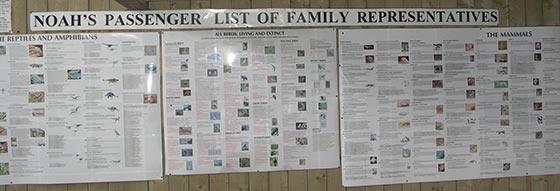
The Manifest of Noah’s Ark, according to its modern day purser, Anthony Bush.
Bush’s warmth and good cheer were appreciated on this blistering cold snowy day, one of the worst witnessed in the UK in decades. As we started our tour Mr. Bush made it clear to me that he did not to be confused with those “loonie American creationists” who think that the earth is only 6,000 years old. No, no, the Earth is much older than that, he proclaimed. “How old do you think it is?” I queried. “Oh, I’ve worked it out to be around 100,000 years old, with Adam and Eve at around 21,000 years old.” No, indeed, there was no confusing Mr. Bush with those nutty American creationists! And what was happening between those two time spans? If I understood Mr. Bush correctly, he believes that between the creation at 100,000 years ago and Adam and Eve 21,000 years ago, there was the pre-Adamite period during which the dinosaurs roamed.
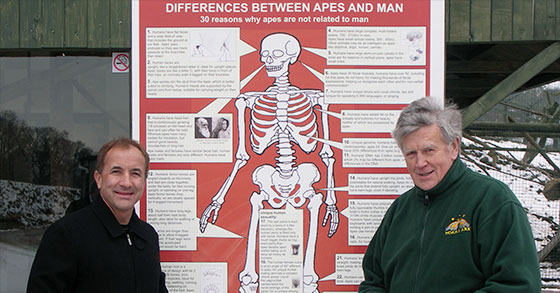
The author and Mr. Anthony Bush, the curator and administrator of Noah’s Ark Zoo Farm, discuss the differences between apes and humans.
What about all the geological evidence for a much older Earth, I pressed on? All those strata of, say, sandstone, which was once loose sand compressed into solid rock over immense periods of time — how could that possibly happen over thousands instead of millions of years? Those strata are laid down every season, like tree-rings, he explained. Interesting analogy, since we can see trees growing from year to year, but where on earth can we see sand being compressed into stone each year?
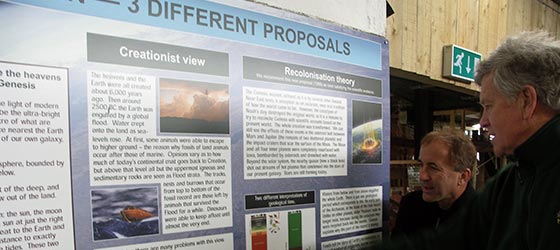
Noah’s Ark captain, Anthony Bush, explains to Michael Shermer the recolonization theory, which holds that the modern geographic distribution of species around the globe today all happened after the flood destroyed all life on earth (even the fish drowned?) and Noah released the animal pairs to go forth and multiply.
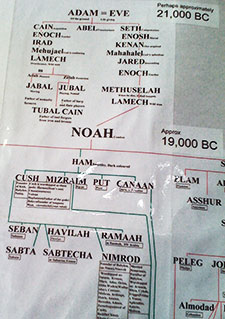
Noah’s Ark Zoo Farm features educational posters for British school children to read on their tour, including this one showing the lineage of Adam and Eve.
The conversation turned most passionate for Mr. Bush when we arrived at the primate cages, featuring marmosets and gibbons. Standing next to a poster display of the differences between apes and humans (implying that humans are not apes, which we are), Mr. Bush seemed particularly interested (obsessed really) in the sexual differences between us, insisting that humans are the only primates that copulate in the missionary position (he waxed poetic about how the angle of the vagina and the slant of the penis are perfectly positioned for proper penetration (say that three times!) for producing the orgasm, which God created to keep us together in pair bonds (he offered no explanation for why women get multiples and men only one, and I wasn’t about to ask). He added that we are the only primate to have orgasms. I told him about bonobos, whom Frans deWaal describes as a very sexual primate indeed, including copulating in the missionary position and apparently experiencing orgasms (and if not then they sure seem to be having as good a time as we do during sex). Mr. Bush offered no acknowledgement of this fact, but after more sex talk along these lines I finally said something like “you sure are into sex,” to which he responded “what do you expect, I’m a man?” To which I rejoined: “yes, well, Darwinism explains that nicely, thank you.”
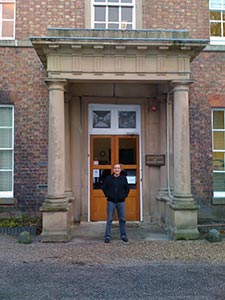
The author in front of Darwin’s birthplace
If you want to read more about the Noah’s Ark Zoo Farm, go to: http://www.noahsarkzoofarm.co.uk/
I haven’t any idea how influential Anthony Bush’s Noah’s Ark Zoo Farm is on the school children who are taken there on field trips, but I was most disturbed by the results of a survey just released there (the “Rescuing Darwin Survey” conducted by the polling agency ComRes on behalf of the Theos thinktank) that was given to me by my hosts to prepare me for my talk on evolution and creationism, indicating that half of British adults do not believe in evolution, with at least 22 percent preferring creationism or intelligent design as an explanation for how the world came about. In fact, according to this survey, only 25 percent of Britons said that they believe Darwin’s theory of evolution is “definitely true,” while another quarter reported that they think it is “probably true.” These results mirror those found in most surveys of American’s attitudes about evolution, although ours are slightly worse. In England, according to this recent survey, fully half of the 2,060 people questioned were either strongly opposed to the theory of evolution, or confused about it. There are even some Young Earth Creationists in the UK, as the survey found that around 10 percent of Britons believe that God created the world some time in the last 10,000 years.
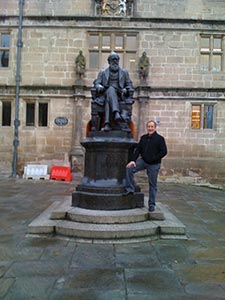
The author in front of Darwin’s school

